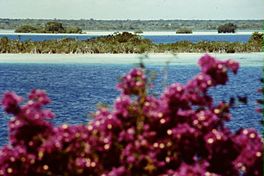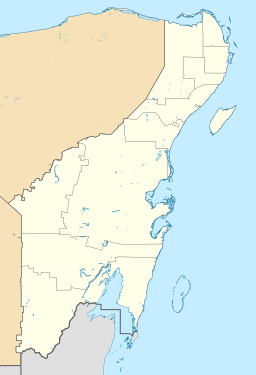Lake Bacalar facts for kids
Quick facts for kids Lake Bacalar |
|
|---|---|

View over the lake
|
|
| Location | Quintana Roo |
| Coordinates | 18°45′00″N 88°18′54″W / 18.750°N 88.315°W |
| Type | Natural lake |
| Primary inflows | (subterranean) |
| Primary outflows | Mangrove surrounded river into the Rio Hondo |
| Basin countries | Mexico |
| Max. length | 42 km (26 mi) |
| Surface area | 42 km2 (16 sq mi) |
| Surface elevation | 0 m (0 ft) |
| Islands | more than 2 |
| Settlements | Bacalar |
Lake Bacalar (also called Laguna Bacalar) is a beautiful, long lake in Mexico. It is located in the state of Quintana Roo, close to Mexico's border with Belize. The lake is about 42 kilometers (26 miles) long from north to south. At its widest point, it is less than 2 kilometers (1.2 miles) across.
Lake Bacalar is famous for its amazing blue color and very clear water. This is partly because the bottom of the lake is made of white limestone.
Contents
Lake Bacalar: Mexico's Blue Gem
Lake Bacalar is often called the "Lagoon of Seven Colors." This is because its waters show many different shades of blue, from light turquoise to deep indigo. The clear water lets you see the white limestone bottom, which helps create these stunning colors.
What Makes Bacalar Special?
Like most water bodies in the Yucatán Peninsula, Lake Bacalar is fed by rivers that flow underground. These underground rivers often create open pools called cenotes. The Yucatán Peninsula has very few natural lakes because its limestone ground is very porous. This means water easily sinks into the ground.
Lake Bacalar is the largest lake in the area. It is connected to a huge underground river system, which is part of the world's biggest underwater cave and tunnel network. This system stretches for about 450 kilometers (280 miles) along the coast.
Ancient Life in the Lake
Lake Bacalar is home to a massive population of stromatolites. These are cauliflower-shaped structures made by tiny living things called cyanobacteria. Stromatolites are some of the oldest forms of life on Earth. They have been around for billions of years! Today, they only exist in a few special places around the world, and Lake Bacalar is one of them. Studying them helps scientists understand early life on our planet.
The Town of Bacalar
On the western side of the lake is the small village of Bacalar. This town has a population of about 11,000 people. It is a popular spot for visitors who want to enjoy the lake's beauty.
Protecting This Natural Treasure
In November 2015, Mexico's environmental protection agency shared a concern about Lake Bacalar. They noted that the lake was facing pollution challenges. This was due to waste not being treated properly. It is very important to protect Lake Bacalar. This helps keep its waters clean and safe for all the unique life that lives there, including the ancient stromatolites. Everyone can help by being careful not to pollute and supporting efforts to keep the lake healthy.
See also
 In Spanish: Laguna de Bacalar para niños
In Spanish: Laguna de Bacalar para niños
 | Jewel Prestage |
 | Ella Baker |
 | Fannie Lou Hamer |


